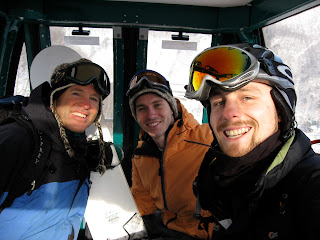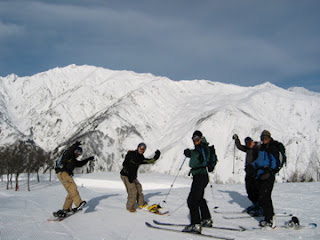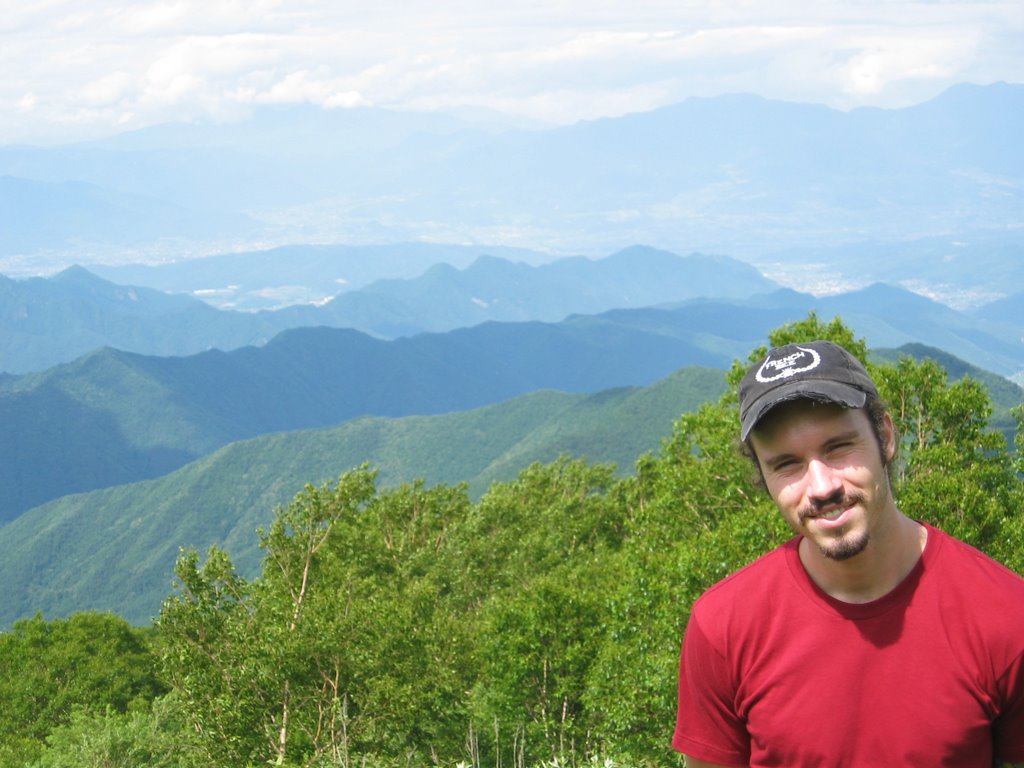 left: A monkey and I last year
left: A monkey and I last year
This blog is long overdue for a post and I apologize. After finally securing an internet connection in my apartment, my hard drive died and I had to have it replaced. Now, finally, I have a functioning computer AND an internet connection.News:1. The trip: I don’t think I’ve sent out a mass email to all of my readers (
“mass” might not be the best word to describe an email that is directed to all three of you) about my plans post-Japan. As of now, I am planning on going on a long bicycle trip that will start in early October of this year. I will ride south from New Jersey, down to the Gulf states, through Texas and into Mexico, down into Central America. From Panama I will either sail or fly past the Darien Gap, an impenetrable tangle of rainforest, toucans, and magic, on to Colombia. South from Colombia along the western coast of South America. I will eventually cross (possibly in Bolivia) over some high and chilly mountain passes and work my way down to the eastern plains. I’m hoping to eventually end up in Rio in Brazil or Buenos Aires in Argentina. From either of these large port cities, I would like to find a job on a trans-Atlantic freighter headed for South Africa. From South Africa, I’ll ride up the Eastern coast of Africa and head towards Cairo.
This is the rough plan as of now. I expect and hope for changes along the way. I am guessing this ride will take 1.5---2 years. Based on blogs that I’ve been reading, through a combination of camp spots and hotels, self-made meals and restaurant feasts, frequent deprivation and rare indulgence, I should be able to complete a trip like this on a budget of $15,000---20,000. Some riders have traveled for the same length of time on larger budgets, some have spent next to nothing.
2. Goal of the trip: The goal of this trip is multi-faceted and revealing itself to me in thin layers, like a rainbow in a ball flashing open its trench coat to a waiting voyeur. As of now, I hope to (as cliché as it sounds—I can think of no other simple way to say it) use the trip to restore my faith in humanity, find the goodness in all people that I know must exist but have been conditioned to doubt. Traveling alone propels one into the open sail of hospitality that far too often hovers just above the chop and spray of routine. I have confidence that I will be invited into people’s homes for the night, asked to join in meals with strangers, helped when stranded on the side of the road. The interest that a loaded bike generates in places where no loaded bikes are typically seen is hot enough to spark the flame of conversation. I also hope to use this trip as a teaching tool. I’m still trying to hash out the details, but I would like to document the trip in some way (via video, writing, photo combination) so I that I might show future students in America and students along the way how people in the world are superficially different while essentially the same. I think the best way to do this would be to do what I have been planning on doing all along: 1. Accept invitations to eat with, stay with, chat with strangers I meet along the way (
in my head I can hear my first grade teacher, using a dolphin puppet and a squeaky voice, saying “Never ever talk to strangers!” This logic is fine for first graders, but we also need to preach the reverse message for our high school and university students to combat ignorance and ethnocentrism and say, “Always, always talk to strangers!!”) 2. Volunteer along the way. I would like to volunteer a few times throughout the trip to kill two birds with one stone—help other people and feed knowledge into my brain’s engine at the same time. I’m not sure where I will volunteer yet, but I’ve already found some amazing opportunities at 2 orphanages and 1 outdoor education/eco-tourism outfit in Central America. I also have another goal for the trip that I think will be easy to achieve simply by seeing the trip to fruition: I want to inspire people I now know and people I meet in the future to travel, inspire people to chase goals and dreams no matter how silly or unattainable they seem, and to encourage others to find constructive ways to shatter the universal government-prescribed life cycle, one that is stifling in its inflexibility and insulting to the brilliance of life in its blandness—
Go to school, get married, get a job, produce, have kids, produce, go to church/temple/mosque/synagogue/football stadium one day a week, pay taxes, produce, pay taxes, produce, die. 3. I’m going to Vietnam over March break for two weeks. I’m excited because I will fly into Ho Chi Minh City and leave from Hanoi, thus allowing me to avoid annoying backtracking to get to my arrival airport. I have no set plans for the trip as of now (and I hope to keep it that way!) I do know that I would like to spend a few days on the beach and a few days touring the Vietcong tunnel system and visiting a good museum in Hanoi that focuses on “The American War” (as my old professor once said, Position Determines Perspective!!)
4. Since I’ve had my new and improved computer, I’ve watched a few documentaries/shows that have set my brain spinning. Two have been about religion/Christianity because I’m reading an amazing book by Mark Twain,
Letters From the Earth, at the moment (in the book, Twain unrolls any shred of validity that may have once wrapped round the bible and uses it to wipe his backside.)
a.
Jesus Camp—About an Evangelical “camp” for kids in Missouri. The camp is used as a training ground for up and coming belligerent, Republican lunatics and a Petri dish for intolerance, hatred, ignorance, and fear. It will make you queasy, beware! Some of these kids “feel yucky” when they are around non-Christians, the leader of the camp hopes that the children will fight for Christianity with the same intensity that fundamentalist Muslims use to fight for the “advancement” of Islam (laying down their lives if necessary), the children (some only seven and eight-years-old) are encouraged to try to convert non-Christians, one child became “born-again” at five-years-old when he felt “there was something missing in his life”, one night of the camp is devoted to anti-abortion lectures, the children (most are home-schooled) supplement their science texts with Christian texts that teach them to “trade their belief in science for their faith.” The whole thing is simply disgusting and fascinating at the same time, like a car wreck in slow motion.
b.
The Virus of Faith by Richard Dawkins—A documentary about how faith resembles a virus that is passed from parent to child and fueled by fear. Dawkins asserts that the quest for truth via science is threatened by the blanket of faith that stifles curiosity and concern for the environment. There’s a great section of the film where he interviews a woman who was forced into Christianity as a child by her parents. The woman describes childhood religious indoctrination as a form of child abuse because children are forced into believing in an ideology because of different fears-----fear of things like hell, fear of disappointing their parents, and if they live in a very religious society, fear of being a social outcast.
I wonder: Why can’t children be educated about the religions of the world so that they can choose their own religion when they are adults, when they are old enough to fully understand the implications of their belief in faith??? To decide for your child that he/she will be a Muslim or a Christian is to make a decision that no human is qualified to make for another. Dawkins is articulate and the questions he poses are immense and thought-provoking. I first heard of him because I read that Douglas Adams was influenced by Dawkins and impressed with the simplicity and strength of his logic regarding faith and evolution.
c.
The Power of Myth—Interview of Joseph Campbell by Bill Moyers before Campbell’s death at 82. Campbell spent his life studying world mythology and, over a 6 part series, tells Moyers about all he’s learned in a lifetime of study. AMAZING! Covers many religions, countless countries and cultures, dozens of myths and their implications, and how to “follow your bliss.”. Moyers said Campbell was “one of the most spiritual men” he knew and I think it shows in this series. Campbell
knows. So many people say they
know,
but he glows it. You have to see it to believe it; it’s spectacular.
d.
Burning Man: Beyond Black Rock—A documentary about the Burning Man art festival held in the Black Rock Desert in Nevada every year. If you want to learn how a group of people are able to build a city for 35,000 people in the middle of the desert, hold a week-long festival, and break it down without leaving a trace (largest “Leave No Trace” project in the entire world) only to do it again the next year, check out the video. In terms of organization, it makes my trip seem like a walk to the toilet.
5. In the past month, out of necessity, I’ve been writing by hand a lot. I usually don’t write by hand because I’m left-handed and I always smudge my writing across the page. Also, on those rare occasions when the writing rushes from me like a mouse from a house fire, I feel as if I can’t write fast enough by hand. I like to type because I can type quickly and can edit as I type (
some might argue that this weakens and thins the filter of the mind and prevents thoughtful censorship. Kerouac would say the filter can’t be destroyed soon enough). I can also keep a certain visual format throughout a poem as I type (
sometimes this itself helps me think of material by just seeing how long the next line should physically be) and when I write by hand, I often cross out lines and scribble over the text and distort the shape of my writing. I also think that a page covered in scribbled lines and cross-outs is one that is less inviting for the writer to re-visit. I’m intimidated by a messy page and find it harder to sit down and finish something when mistakes are screaming out at me from under a pile of crossed out words. I think I’ll continue to prefer the computer for a long while, but I’m fascinated by how simple format/process changes can affect writing. I’m sure this information is interesting to no one except me, and after re-reading this paragraph, I’m annoyed that I just wasted time writing it.
More to come as life unfolds,
Andrew
 Need some inspiration? Counting dustballs on your desk at work? Here you go, inspiration free of charge!
Need some inspiration? Counting dustballs on your desk at work? Here you go, inspiration free of charge!















